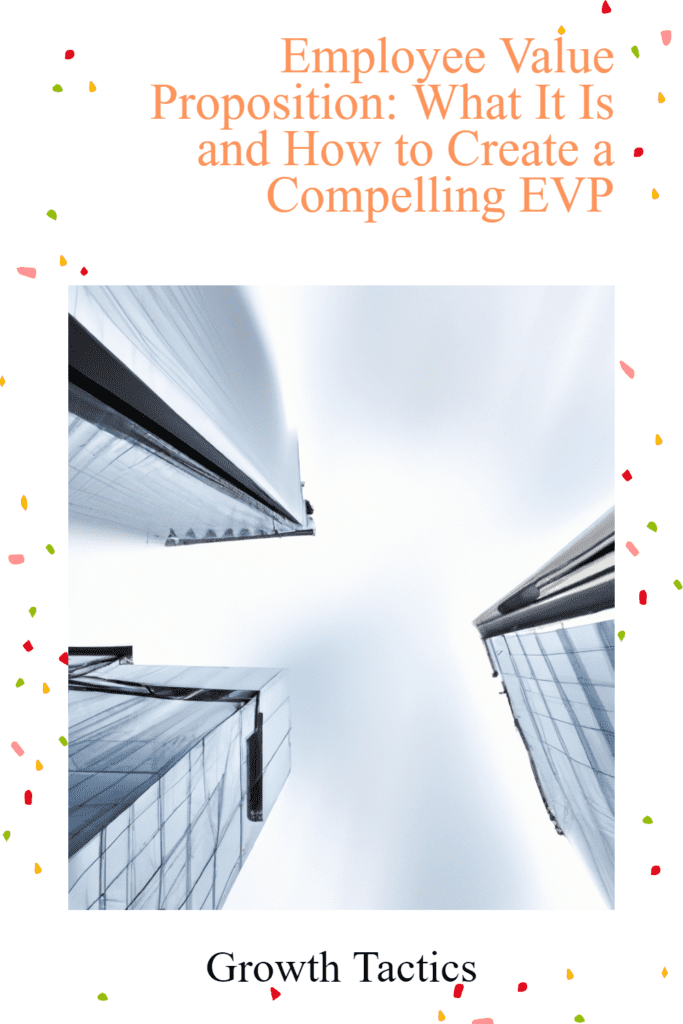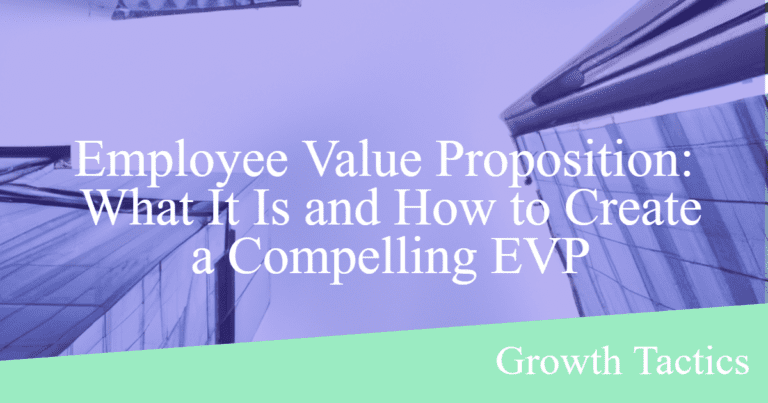If you’re looking to attract and retain top talent, then you need to have a strong employee value proposition (EVP) in place. Your EVP is what sets you apart as an employer and defines your company’s culture. In this article, we’ll be exploring what an EVP is, why it’s essential, and how you can create a compelling EVP for your organization.
Jump To Section
What Is an Employee Value Proposition?
Your EVP is the unique offering your organization provides to its employees. It encompasses the value that employees receive from the employment relationship, including the rewards, development opportunities, and work environment.
Why Does a Compelling EVP Matter for Business?
A strong Employee Value Proposition (EVP) is crucial. It impacts not just the success but also the sustainability of your business. Here’s why it matters:
- Attract and Retain Top Talent
- Stands out in a competitive job market.
- Helps high-performers choose your company.
- Improves employee retention, reducing costs and ensuring stability.
- Drive Employee Engagement
- Boosts productivity, innovation, and commitment.
- Creates purpose and aligns employees with your mission and values.
- Provides meaningful work and growth opportunities.
- Enhance Company Culture
- Shapes and strengthens the employer-employee relationship.
- Fosters a positive work environment with collaboration and trust.
- Builds a culture where employees feel they belong.
- Differentiate From Competitors
- Sets your organization apart in competitive industries.
- Becomes a deciding factor for candidates with multiple job offers.
- Builds a strong employer brand, attracting talent and boosting customer confidence.
- Increase Customer Satisfaction
- Engaged employees deliver exceptional customer experiences.
- Motivates employees to provide top-notch service.
- Enhances customer loyalty and creates positive word-of-mouth.
Incorporating a compelling EVP ensures your business not only survives but thrives in today’s market.
What Are the Key Components of an EVP?
To create a strong EVP, you need to consider the following key components:
Employer Brand
Your employer brand is the way your company is perceived by existing employees and the external target audience. It’s the promise you make to your employees, clients, and candidates about what they can expect from your organization.
Compensation and Benefits
Compensation and benefits are an essential component of your EVP. Research shows that organizations that offer competitive compensation and benefits packages can decrease annual employee turnover and increase new hire commitment.
Work-Life Balance and Stability
Employees want work-life balance and stability. They want to have the flexibility to manage their personal and professional lives effectively.
Employee Development
Learning and development opportunities are an essential component of your EVP. They enable your employees to develop their skills and take on new challenges, leading to increased employee engagement, retention, and productivity.
Career Development
Employees want to grow in their careers, and they seek opportunities for advancement within your organization. A great EVP includes career development opportunities that enable employees to achieve their professional goals.
Work Environment
Your work environment plays a crucial role in employee engagement and retention. A positive work environment can help your employees feel more productive, motivated, and satisfied.
Corporate Values
Your corporate values are an essential component of your EVP. By leveraging your corporate values, you can create an emotional connection with your employees and align them with your organization’s goals.
How to Create a Strong EVP?
Creating a strong Employee Value Proposition (EVP) requires careful analysis, strategic planning, and effective communication. Follow these steps to create a compelling EVP for your organization:
- Evaluate Your Current EVP: Assess your organization’s current EVP. Identify strengths and weaknesses, gather feedback from employees, and understand what sets you apart from competitors.
- Define Your Unique Selling Proposition (USP): Determine what makes your organization unique and attractive to employees. This could be your company culture, growth opportunities, work-life balance, or any other compelling factor. Identify the key attributes that differentiate you from other employers and form the foundation of your EVP.
- Align EVP with Corporate Strategy and Values: Ensure that your EVP aligns with your company’s overall corporate strategy and values. It should reflect and reinforce your organizational goals, mission, and values. This alignment creates a cohesive and authentic EVP that resonates with employees.
- Create a Compelling EVP Statement: Craft a concise, clear, and compelling EVP statement that encapsulates the value your organization offers to its employees. The statement should highlight the key components of your EVP, such as career development, work-life balance, and a positive work environment. Make it memorable, impactful, and aligned with your USP.
- Effectively Communicate Your EVP: Develop a comprehensive communication strategy to effectively deliver your EVP to both current employees and potential candidates. Utilize multiple channels such as internal communication platforms, career websites, social media, and recruitment materials. Ensure consistency in messaging, and make sure your EVP is visible throughout the employee lifecycle, from recruitment through to ongoing employee engagement and development.
- Deliver on Your EVP: Consistently deliver on the promises and offerings outlined in your EVP. Ensure that your organization provides the benefits, opportunities, and work environment that you have communicated to employees. Continuously evaluate and adapt your practices to fulfill your EVP and address evolving employee needs.
- Monitor and Evaluate: Regularly monitor and evaluate the effectiveness of your EVP. Solicit feedback from employees, measure employee engagement and satisfaction, and assess recruitment and retention rates. Use these insights to refine and improve your EVP over time.
Remember, creating a strong EVP is an ongoing process that requires continuous evaluation, adjustment, and improvement. By investing in a compelling EVP, you can attract top talent, engage and retain your employees, and create a competitive advantage for your business.
Examples of Strong EVPs
A strong Employee Value Proposition (EVP) is an essential tool for attracting, engaging, and retaining top talent. Here are some examples of organizations with compelling EVPs:
- Salesforce: Salesforce’s EVP is centered around a culture of high performance and innovation, with a strong focus on employee growth and development. Their EVP highlights their commitment to employee well-being, flexible work arrangements, and equal opportunities. They emphasize their core value of giving back to the community, encouraging employees to volunteer and make a positive impact in society.
- Hubspot: Hubspot’s EVP is built around creating an inclusive and supportive work environment that promotes autonomy and creativity. They value transparency, continuous learning, and teamwork, emphasizing their commitment to fostering a culture of mentorship, collaboration, and career growth. They encourage employee innovation by providing a $5,000 yearly budget for personal projects.
- Zillow Group: Zillow’s EVP emphasizes their focus on work-life balance, career growth, and a supportive work culture. They provide competitive salary and benefits packages, flexible work arrangements, and ample opportunities for employee development and training. They prioritize employee well-being, offering on-site gyms, wellness programs, and regular social events to encourage a sense of community and connection.
- Netflix: Netflix’s EVP emphasizes their dedication to creating a creative and autonomous work environment that prioritizes employee freedom and responsibility. They value continuous learning and growth, providing ample opportunities for employee development and training. They emphasize their focus on delivering exceptional customer experiences and their commitment to diversity and inclusion.
- Hootsuite: Hootsuite’s EVP is centered around fostering a collaborative and supportive work environment that encourages autonomy and creativity. They value transparency, continuous learning, and teamwork, providing ample opportunities for employee development and training, and emphasizing their commitment to fostering a culture of mentorship and career growth. They prioritize employee well-being, offering a flexible work environment and a supportive community of colleagues.
In summary, these organizations’ EVPs align with their corporate strategy and values, showcase their unique strengths and offerings, and prioritize employee well-being and growth. By investing in a strong EVP, these companies attract and retain top talent and create a competitive advantage in the marketplace.
Conclusion
Creating a compelling EVP is a critical component of attracting and retaining top talent. By leveraging your unique selling proposition as an employer, you can set yourself apart from other organizations and create a strong bond with your employees. Remember, your EVP is an ongoing process, and you need to continually evaluate and evolve it to meet the changing needs of your workforce.
Key Takeaways
- Your EVP is the unique offering your organization provides to its employees.
- A strong EVP can help you attract and retain top talent, increase employee engagement, and drive business success.
- The key components of your EVP include your employer brand, compensation and benefits, work-life balance, employee development, career development, work environment, and corporate values.
- To create a compelling EVP, you need to evaluate your existing EVP, define your USP, align your EVP with your corporate strategy and values, create a compelling EVP statement, and effectively deliver on your EVP.
- Examples of strong EVPs include Google and Salesforce.
FAQ
What is an Employee Value Proposition (EVP)?
Your Employee Value Proposition (EVP) is the unique offering your organization provides to its employees. It encompasses the value that employees receive from the employment relationship, including rewards, development opportunities, and the work environment.
Why does a compelling EVP matter for business?
A compelling EVP is crucial as it:
- Attracts and retains top talent
- Enhances employee engagement and productivity
- Shapes and strengthens company culture
- Differentiates your organization from competitors
- Increases customer satisfaction by fostering loyal and motivated employees
What are the key components of an EVP?
A strong EVP consists of multiple components, including:
- Employer Brand: The way your company is perceived by employees and candidates
- Compensation and Benefits: Competitive packages that attract and retain employees
- Work-Life Balance and Stability: Flexibility for personal and professional life management
- Employee Development: Opportunities for skills development and career growth
- Career Development: Clear paths for advancement within the organization
- Work Environment: A positive and productive work atmosphere
- Corporate Values: Values that create an emotional connection with employees and align with organizational goals
How can I create a strong EVP?
To create a strong EVP, follow these steps:
- Evaluate your current EVP to identify strengths and weaknesses.
- Define your unique selling proposition (USP) focusing on what makes your organization attractive to employees.
- Align the EVP with your corporate strategy and values.
- Craft a compelling EVP statement that highlights key components and differentiators.
- Effectively communicate your EVP through multiple channels and ensure it is visible throughout the employee lifecycle.
- Consistently deliver on the promises outlined in your EVP.
- Monitor and evaluate the effectiveness of your EVP and make adjustments as necessary.
Can you provide examples of strong EVPs?
Here are a few examples of organizations with compelling EVPs:
- Salesforce: Focuses on high performance and innovation, employee growth, well-being, and community impact.
- Hubspot: Emphasizes an inclusive and supportive work environment, autonomy, creativity, transparency, continuous learning, and teamwork.
- Zillow Group: Highlights work-life balance, career growth, and a supportive work environment.
How does a strong EVP impact employee engagement?
Engaged employees, driven by a strong EVP, are more productive, innovative, and committed to their work. A compelling EVP provides meaningful work, growth opportunities, and a supportive environment, aligning employees with the organization’s mission and values, thus driving engagement and overall business success.
What role does corporate culture play in an EVP?
A compelling EVP enhances company culture by defining the employer-employee relationship and expectations. It fosters a positive work environment, promotes collaboration, trust, and a sense of belonging, and aligns employees with corporate values.
How often should an organization evaluate its EVP?
Regularly. Continuously solicit feedback, measure engagement and satisfaction, and assess recruitment and retention metrics. Use these insights to refine and improve your EVP over time to ensure it remains relevant and effective.


